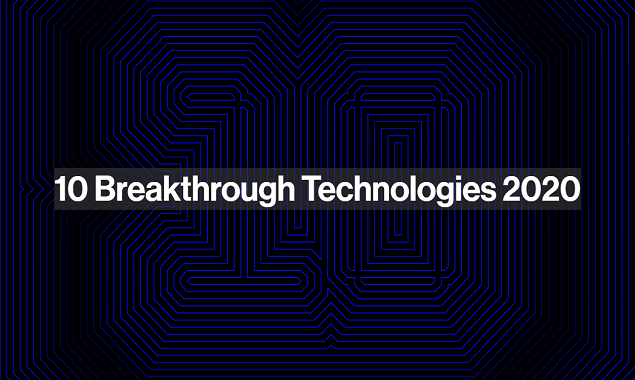
10 Dec 10 Breakthrough Technologies 2020
It’s the time of year when the MIT Technology Review releases its biggest breakthrough technologies for the year. These are technologies that are expected to have widespread consequences for human life in the coming year.
Here’s a rundown of the amazing technologies for 2020:
Satellite Mega-Constellations
The impetus behind satellite mega-constellations is the goal to provide every corner of the planet with high-speed internet. Satellite mega-constellations are the solution to banish spotty Wi-Fi signals and cellular connections. While enabling global connectivity for nearly anyone on the planet, these satellite mega-constellations will also litter space and dramatically increase the number of satellites in orbit very quickly. Without a set of international rules and regulations governing how industry leaders such as SpaceX, OneWeb, Amazon, and Telesat operate, this technological breakthrough could result in chaos.
Tiny AI
It’s now possible for powerful artificial intelligence algorithms to run from our phones and other consumer devices without needing to talk to the cloud. With tiny AI, researchers shrink the size of existing AI models through a process called knowledge distillation without losing any of the algorithm’s capabilities or performance speed. The benefits of having access to AI algorithms from our devices include not experiencing latency because there is no communication with the cloud, and there are less privacy issues. Google, IBM, Apple, and Amazon are leaders with this technology.
AI-Discovered Molecules
In a nod to the power of humans and machines collaborating, scientists are using AI to discover molecules that can have an amazing impact on healthcare. Recently, machine learning was used to identify a powerful new type of antibiotic. This is the first time AI was able to identify a completely new kind of antibiotic from scratch. It’s extremely expensive to develop a new drug in part because it’s a challenge to identify molecules. With AI on the job, millions of molecules can be evaluated quickly and effectively.
Quantum Supremacy
While we are likely five to 10 years away from achieving quantum supremacy, when a quantum computer can outperform a classical computer, Google claimed it has already achieved this milestone with its Sycamore quantum processor. Sycamore was able to determine a set of randomly distributed numbers in three minutes and 20 seconds (the company estimated it would take a classical computer 10,000 years to complete the task). While this feat was impressive, they acknowledged that we are years (if not decades) away from having a quantum computer that can solve problems we’re interested in solving—those problems that classical computers can’t manage.
Climate Change Attribution
As a result of improved computer processing power, scientists are now able to attribute the role of climate change in severe weather events. This knowledge helps us figure out how to prepare for future events as well as gives evidence to hold governments or corporations responsible for damage done by severe weather events caused by climate change. Climate change attribution informs the conversation and climate litigation that is becoming more prevalent as climate change causes weather events that result in property and lives lost.
Anti-Aging Drugs
While the fountain of youth might still elude us, we’re getting closer to having anti-aging drugs on the market. Many different diseases, such as cancer, dementia, and heart disease, could be improved or prevented if we can slow down the aging process. These drugs would target a natural aging process in the body. There has already been some success with these drugs in human tests.
Unhackable Internet
As recent news reports convey, the internet we use today is vulnerable to hackers. There are people working on creating the first quantum internet, which would be completely secure from hackers. One of the organizations working to achieve an unhackable internet is the Delft University of Technology, which is expected to complete a quantum internet between Delft and the Hague later this year. The basis of a quantum internet, entanglement, ensures security—it’s physically impossible to eavesdrop when two users are on an entangled network.
Digital Money
The use of physical cash continues to decline as digital currencies grow. Digital money only exists in digital form, and this has big ramifications for financial privacy. Along with benefits such as instantaneous transactions, it also might mean transacting through a new intermediary or cutting out traditional intermediaries altogether. In the case of cryptocurrencies using blockchain technology, the money supply is decentralized and can come through various sources. Digital currency technology has the potential to splinter the global financial system.
Hyper-Personalized Medicine
Imagine that you can get a drug that was customized for a rare disease or genetic mutation. This capability is no longer only a figment of someone’s imagination—it’s possible. When medicine is tailored to the exact needs of a single patient, it will make treatment and cures possible for ailments that went untreated in the past. Hyper-personalized medicine will bring hope to many who suffered from incurable diseases.
Differential Privacy
Differential privacy will be used in the 2020 US Census—the largest-scale application to date. Differential privacy allows organizations to collect and share aggregate information about users from data that was submitted or gathered while keeping the identities of the individuals private. The goal is to maximize the use of the data while not harming the individual’s privacy. With differential privacy, the raw data cannot be accessed by data scientists or database managers. Differential privacy gives organizations a way to solve the privacy problem as well as build trust.
